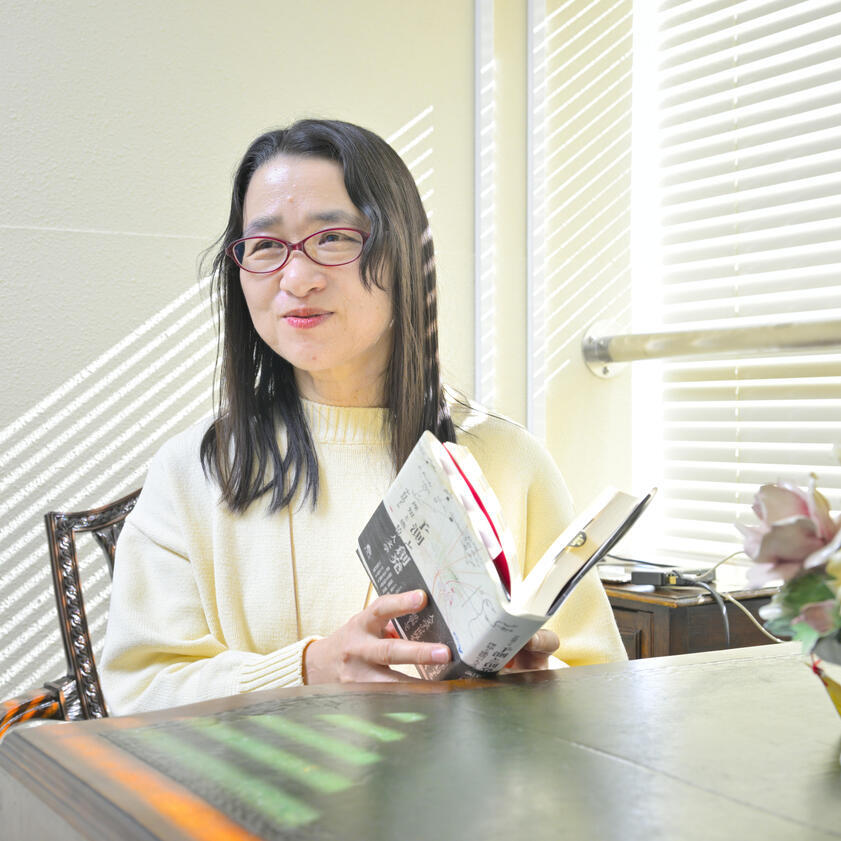Professor Ryuichiro Higashinaka

Researchers'
Professor
Yasuko Nakamura
Graduate School of Humanities
When I first heard this phrase—I think in junior high school—I was taken aback. The idea that we don’t have to abandon the physicality and nowness of “being here” in order to dream of things far away was really eye-opening to me. I also appreciate that it refers to “all things far away” instead of something “as far away as possible,” because it helps to create gradations of distance and not converge on a single extreme.
I am so curious about how human beings acquired poetic imagination (poesie) that I want to unravel this riddle. A single person can only experience a very limited number of things in a single life, but as Swiss writer Max Frisch said, of all the sphere of human experiences, the vast majority are memories and anticipations. Freud would add inference to these. I also learned from Rilke’s poems that the realms explored by anticipation, memory, and inference are more infinite than the Universe.
I have been studying Rilke since my undergraduate days, so I planned and prepared to write about his "The Notebooks of Malte Laurids Brigge" as my doctoral dissertation. However, I was asked to translate Freud's "On Aphasia," which led to me becoming interested in linguistic competence issues and how brain functions were researched at the end of the 19th century. As a result, my dissertation topic changed to Freud’s aphasia research. My dissertation supervisor (called doktorvater) said to me in disappointment, “Weren't you writing your dissertation on literature?” He also said that nobody in Japan had ever written their doctoral dissertation on Freud. If it’s true, it’s a great honor for me. After that, I still felt sorry for my doktorvater, so I actually later published a book on literary studies.
She was responsible for the first volume of the Complete Psychological Works of Sigmund Freud (published in 2009), in which she translated his pre-psychoanalysis studies. This experience later led her to take part in a number of collaborative studies.
I’m not at all tech-savvy; I couldn’t even really use Excel. In 2017, I began working on an interdisciplinary joint research project, and one of my colleagues happened to be a leading figure in the field of text mining. I never would have thought to do text mining on my own, and I don't think I would have been able to do it on my own. This gave me a great appreciation for the value of joint research.
There are times when something that seemed trivial, something I didn't bother to think much about, will years later strike me in a completely different context with a sudden realization: “That’s what it was all about?!” In the words of the poet Rilke, “A day on which we passed strangely / decides in the future to be a gift.” Maybe he meant that if we can remember even the most insignificant, trivial things, we will someday create their meaning. If so, just remembering may gradually fill up the empty mind with content.
The catalyst for the establishment of the Center was having our research proposal accepted by the Japan Society for the Promotion of Science's “Topic-Setting Program to Advance Cutting-Edge Humanities and Social Sciences Research.” The subject of our research project is Anthropocenic Actors and Agency in Humanity, Society, and Nature, which we call the AAA Project for short. This project is made up of 24 members in five research groups across the humanities, social sciences, and natural sciences. The Center, which serves as the AAA Project's base of operations, was scheduled to be inaugurated on November 1, 2022. I asked the Dean of the Graduate School of Humanities, “Are we going to do anything that day?” Then I realized that we hadn’t ordered a nameplate for the Center. At the time, the Center had nothing, not even an office. Eventually, we had a space, which we called all sorts of nicknames like the “storage shed” or “penthouse,” and we managed to get it into shape as an office by the end of 2022. I am truly grateful to everyone who contributed their efforts.
With people involved in the Humanity Center for Anthropocenic Actors and Agency.
(All of the researchers are from completely different fields.)
I hug my dog. I love how he doesn’t seem to care whether I hug him or leave him.
Freud's papers on brain functions were written under the technological limitations of the late 19th century, but even when we look at his work with modern eyes, with all the ways that technological development has expanded our understanding of the world, we’ve learned that Freud's thinking holds true in many respects.. I think this is the reality of thought. Recently, I have been thinking about using text mining to trace mental changes over several decades across many languages.
Name: Yasuko Nakamura
Department: Nagoya University Graduate School of Humanities
Title: Professor
Profile/Hobbies:
Dr. Yasuko Nakamura attended Osaka University, earning her bachelor's degree at the School of Letters and her master’s and doctoral degrees at the Graduate School of Letters. In 1994, she became a lecturer at Toyama University, where she later became an assistant professor. Since 2000, she has worked at the Graduate School of Humanities at Nagoya University, where she served as assistant professor and associate professor before becoming a full professor in 2011.
She says, “When I find a flower that was mentioned in a poem or a novel, I impulsively buy it. It makes me really happy to see it bloom again the following year.”